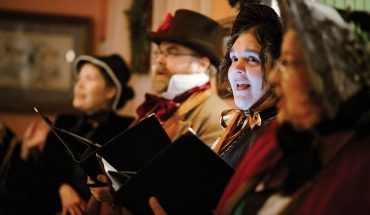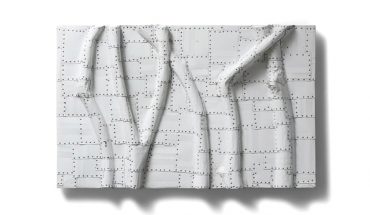by Luther H. Hodges Jr.
After a recent period of personal upheaval, retired North Carolina Democratic politician and banker Luther H. Hodges Jr., 76, sought solace and insight in adventure: a walking safari in Africa. Unplugged and surrounded by the vast wild of Kenya’s Tsavo National Park, the UNC adjunct professor – who is a former U.S. deputy secretary of commerce, former chairman of North Carolina National Bank, former chairman of The National Bank of Washington, and the son of former North Carolina Governor and U.S. Secretary of Commerce Luther Hodges – kept a travel diary he agreed to share with Walter. Dedicated to “the mother of all adventures – life itself,” Hodges (now a Republican) says his diary, which he recently published with BW&A Books of Durham, aims to chronicle not just his travels, but also his changing perspective. “Traveling, writing, and reading are all good for the soul, and I only hope to be returning a better man,” he says. Following is a much-abridged version.
The Great Walk
Africa is not a new continent to me. I visited North Africa as a young naval officer and as a tourist, and went to West Africa in 1962 as the son of the Secretary of Commerce whom President Kennedy sent as the U.S. representative to the Independence Day celebration of Upper Volta (as Burkina Faso was then called). In 1997, I traveled to South Africa and Botswana, and then last fall, I found myself in East Africa, preparing to take a 100-mile walking safari in Kenya’s Tsavo National Park.
I had told my good friend and wonderful traveling companion, Kelly Shannon of Santa Fe, that I would meet him in Zanzibar. We continued our journey to Nairobi, where we met six fellow walkers.
Day 1 – September 24, 2012
Up at daybreak for a brief flight to the southeast, landing in Tsavo. After a drive of several hours, we arrive at our campsite on the banks of the Tsavo River in time for luncheon, complete with a view of three hippopotamuses. Our leader is Julian Wright, a 23-year-old native of Kenya. During lunch he gives us a lecture about safety around dangerous animals: Among other things, we are to walk in single file, with no talking. The group becomes quite pensive.
We spend the afternoon acclimating ourselves to our new environment. The facilities are more than adequate, and our tents will be moved further down the road each day. We are clearly “roughing it.” In my case, growing a beard will reduce the need for running water.
Day 2
Up at 6 a.m. and on our way. The eight of us walk single file, regularly altering the leader of the group. We are preceded by our guide/tracker/scout, who carries a large, powerful rifle. Another guide, who carries a spear and a machete, immediately follows him. Bringing up the rear is another spear-armed man, plus a park ranger carrying an automatic rifle. We feel protected!
As we walk along a narrow path that follows the river, we see elephant dung everywhere, but no elephants. Ample signs indicate that many other animals have been in the area, clearly all coming to the river for water. It is, as my father would say, “Hot as Hades!”
Day 3
We walk through a valley close to the border of Tanzania and Kenya, the site of numerous battles during World War I, when Germans and the British fought over the future of East Africa. In coming days, we expect to see the British railroad between Nairobi and Mombasa, which also was the scene of various battles.
Then we find some real excitement, enough to convince us that we don’t want to meet exotic animals up close. Our guide sees tracks, and then we hear a loud roar.
Our guides move us quickly away: We’ve come very close to a group of elephants, including some little ones. We wait until we see the elephants move in another direction, and we carefully walk around them. They go their way, and we go ours! It is interesting to see just how camouflaged the huge elephants can be in the scrub brush, which is so ample in the valley.
After lunch, we take the vehicles to the entrance to Tsavo National Park. Near this entrance is a special site that our leader wants us to see. To dramatize the event upon arrival, he reads directly from Maneaters of the Tsavo by Lt. Col. Patterson, a British Army officer at the turn of the last century. Colonel Patterson had made a career of trying to locate these famous man-eating lions, and in the book he describes a site where he found human remains. Sure enough, the description matches our location next to a mammoth rock cave that had been their home 115 years ago.
In Tsavo, you see life played out at its most fundamental level; you witness the battle for survival. Our conventional, modern lives do not afford us such an awareness of life and death.
Half way! And a full moon! Up at daybreak, and across the much larger river. Our new camp is in open fields with volcanic rock scattered everywhere, allowing us to see animals at a relatively safe distance. It is extremely hot – 110 to 120 degrees – and the landscape is similar to the high desert of New Mexico and Arizona, but with uprooted dead trees, courtesy of the elephants. We see many, many elephants, some quite close to us; also, giraffes and buffalo, zebras, cheetahs, and a lion. I photograph a dead impala, partially eaten by a leopard.
Then, after a long morning of walking, I find a large male elephant 10 feet from my tent! He slowly walks around camp and departs at a leisurely pace, followed by a baboon who knocks down some of the supports to my tent. I get all the action, as my tent is the furthest away.
While the group heads out for a game drive that evening, Kelly and I stay to enjoy the camp and our cocktail hour and to photograph the sunset and the rising full moon. The moon is beautiful. On the following morning at daybreak, you can see that moon setting on the horizon at the same time the sun was rising on the opposite horizon.
Kelly and I discuss the fact that while many of us are fortunate to be able to do what we like, few are aware of how important and meaningful it is to venture out of a life of pleasure and to enter a world of loneliness and reflection, surrounded by few of our traditional conveniences.
Day 9
This evening we drive to a spot atop large volcano boulders, allowing a clear view, just after sunset, of Mount Kilimanjaro. We are told that such a clear sighting of Africa’s highest mountain is quite rare, and I am reminded of a childhood trip with my father in 1948. He had read about Mount Fuji, Japan’s holy mountain, but he was told that the mountain was rarely seen from Tokyo. As we took off from Tokyo for Honolulu, the pilot announced that Mount Fuji was visible from the airplane. My father said to me, “The Hodges luck still holds up!” This story is captured in his journal of that trip, Around the World in 30 Days.
My father always wrote his sisters about his travels, as they would never have such an opportunity. He loved to travel, as do I, which has offered me the opportunity to develop the important perspective of a “world view.”
Day 10
The last leg of “The Great Walk.” The sky is somewhat overcast; the rainy season is closer. I am curious about what the area will look like in the fall, when, I am told, all will be very green, and the river at least twice as large as at present. We have traversed some 100 miles of East Africa, and we are all proud of the journey. I confess that the soles of my feet began to wear out just as the walk concluded!
Clearly, the adventure has been a marvelous experience. As planned, I spent much time alone with my thoughts. Unfortunately – but interestingly – I reached no conclusion about my future years. My real purpose in accepting the challenge was to find the opportunity to be alone with myself and to come to terms with life. Certainly, we were all very much away from civilization for virtually two weeks, a unique experience for me. Where do I go from here? As I write by the sandy shores of the Galena River, I have no answers.
As I have walked, I have thought a great deal about friends and friendship. When I was acting secretary of commerce or when I was a successful banker, I had countless “friends.” When a majority of voters thought that I was “the only person” who could possibly defeat Sen. Jesse Helms, I had even more “friends!” But when I lost the election – and no longer enjoyed a major position of power within the banking industry – I was amazed at how few real friends I had. Today with my current separation and pending divorce, people who were friends are no longer with me.
There are surely two sides to every story, every issue, but the one truth is that a true friend is someone to cherish. I am blessed with some very loyal, close friends. I am forever grateful for their true friendship.





